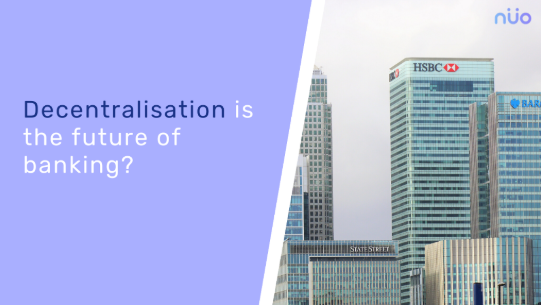Viewpoint | Why decentralized banks will take over the traditional financial ecology?
Source: Medium
Compile: First Class (First.VIP)_Jaden
Why can decentralized banks take over the traditional banking system?
- Speed reading | Marketers must read: Introduce the concept of decentralized branding; why is it important to adopt large-scale?
- BCH protocol upgrade countdown: More than 68% of BCH nodes support upgrade
- Zhejiang Provincial Party Committee Secretary: Strive to become the leader of the development of blockchain
In recent years, public trust in traditional banking systems has been greatly reduced. People are looking for alternative systems that can fully control their deposits and investments. The world of trustworthy, decentralized digital currency guarantees this to them. Therefore, the decentralized banking system is no longer an unreachable idea, but a reality that is recognized by the mainstream and is about to be realized.

Why is decentralized banking the future?
The discount on bank confidence was mainly due to the beginning of the 2008 financial crisis, large-scale bank fraud on a global scale, and poor management of top management. The intrinsic nature of decentralized banks ensures that participants can escape financial crises or fraud crises with great probability and will not lose their digital assets because of opaque transactions and poor management of top management.
What is a decentralized bank?
In July 2018, Coin Ann announced the investment in Founders Bank. Founders Bank will be the world's first decentralized and community-based bank. Once an EU bank license is obtained, the bank will allow all market participants to become their co-founders and adopt a blockchain governance model. This will increase transaction transparency and is the biggest advantage of decentralized banks. Its operational philosophy is to “de-trust” and reduce the role of intermediaries.
Intermediaries are replaced by smart contracts and peer-to-peer servers, allowing direct transactions between lenders and borrowers. People anywhere in the world can be a node in the banking system, something that traditional systems can't do. A person only needs a mobile phone or desktop computer to access the Internet and can access decentralized banks from anywhere.
Decentralized banks can mainly use cryptocurrency as a loan.
What is the difference between decentralized banks and traditional banks?
Unlike decentralized banks, traditional banks cannot operate without intermediaries. Similarly, trust is the key to its operation. This is at the heart of their relationship with their customers, who have no say in their governance or lending. Moreover, traditional banks do not provide financial freedom and they do not have the appropriate technology to ensure the democratization of their financial systems.
This is the main difference between a decentralized bank and a traditional bank.
Lending program
In the traditional banking system, the intermediary decides whether to lend money to someone. The fund owner has no right to decide. Neither bank told them how to use the funds. Its trading process is opaque and there is too much paperwork. Banking also has geographical restrictions, and not all places can borrow money from traditional banks. In addition, if an individual's financial situation is not good, they cannot borrow from the bank.
Decentralized banks can provide lending services like traditional banks. However, it does not have a specific office space, but is in the form of a computer interface that can be accessed from anywhere via the Internet, and there is no decision-making meeting hosted by the top management or an intermediary that approves or rejects the loan request.
Blockchain technology plays a key role
Blockchain technology is a distributed, decentralized ledger that records all transactions. The lender does not have to rely on the intermediary to check whether the borrowed digital asset has reached the expected borrower. Distributed ledgers are not tamperable, so no one can change them. Traditional banking systems do not have this technology. As a result, fund owners are always ignorant of bank borrowers, and sometimes, some bank executives modify data to deceive investors and regulators.
Smart contract
Smart contracts are self-executing contracts with terms and conditional protocols written in lines of code that exist in the decentralized blockchain network. Moreover, in the decentralized banking system, they enforce the obligations of the participants, ensure credible transactions, and eliminate the need for intermediaries, and also ensure that the transaction process is conflict-free and accurate. In addition, smart contracts enable cross-border transactions. The traditional banking system does not have a smart contract, and it is the obligation of the intermediary to supervise the transaction process and execute the borrower and the lender.
In short, with the rapid expansion of the cryptocurrency market, more decentralized banks are expected to emerge in the future.
Please reprint the copyright information.
We will continue to update Blocking; if you have any questions or suggestions, please contact us!
Was this article helpful?
93 out of 132 found this helpful
Related articles
- QKL123 market analysis | Bitcoin halved, history will not simply repeat (1111)
- Ethereum co-founder Joseph Lubin: I hope that the public chain such as Ethereum can interact with the central bank's digital currency
- One of Silicon Valley's top VCs, a16z, announced a free start! Dedicated to cryptocurrency and blockchain entrepreneurs
- Legal tender, gold and bitcoin: Three PKs in the form of three currencies, which is the most ideal?
- Chief analyst of the financial industry of Guosen Securities Economic Research Institute: Will the central bank's digital currency shake the banking business logic?
- This weekend, the EOS network was blocked by an airdrop.
- Cai Kailong: Wuzhen World Blockchain Conference 10 points summary, my round table is so hot that "almost hit"




